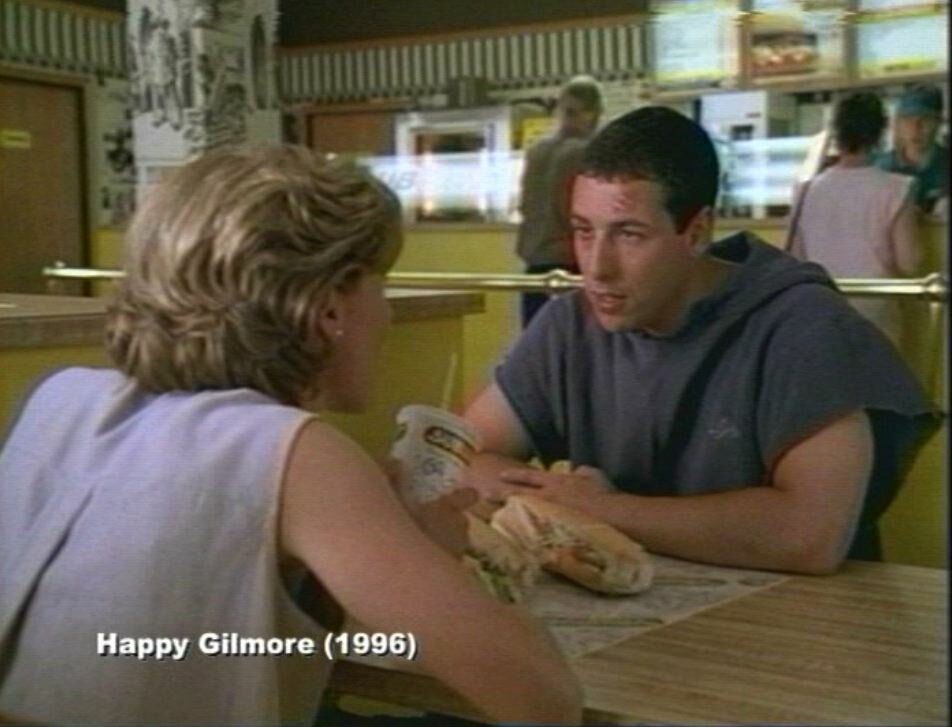 I don’t think I’ve mentioned this to anyone, but I’ve stopped watching Chuck. There are a number of factors contributing to this, especially being in the fortunate position of having so much stuff to choose from right now, but there was a moment I can recall clearly in my mind the last time I actually watched the show that has stuck with me: The use of the phrase “5 dollar footlongs” to describe the sweet deal they got on sandwiches for a bachelor party they’re throwing. It was a bald-faced endorsement for Subway and it rocked my ability to be able to defend the show to newcomers. I am sympathetic to the idea that shows need to make money however they can in order to sustain a certain level of quality when it comes to production value, but you can’t just resort to writing lame corporate sales slogans into the show’s dialogue.
I don’t think I’ve mentioned this to anyone, but I’ve stopped watching Chuck. There are a number of factors contributing to this, especially being in the fortunate position of having so much stuff to choose from right now, but there was a moment I can recall clearly in my mind the last time I actually watched the show that has stuck with me: The use of the phrase “5 dollar footlongs” to describe the sweet deal they got on sandwiches for a bachelor party they’re throwing. It was a bald-faced endorsement for Subway and it rocked my ability to be able to defend the show to newcomers. I am sympathetic to the idea that shows need to make money however they can in order to sustain a certain level of quality when it comes to production value, but you can’t just resort to writing lame corporate sales slogans into the show’s dialogue.

By an odd coincidence (or perhaps it is the actual reason I’m writing about this) I watched Happy Gilmore with my folks this weekend and was reminded of one of the all time most blatant examples of product placement in a movie – when Happy decides to take an endorsement from Subway and be their spokesman. I love Happy Gilmore, I recommend it to friends and those looking for a decent golf comedy, so why is it okay for Happy to shill for Subway and not Chuck? I think I know the answer, but it might only make sense to me:
When Subway makes its commercial appearance in Chuck - it’s merely as a passing thought, something that the writers (more likely the producers) thought they they could sneak by in a way that would satisfy the sponsor, but also not outrage the fans who’ve shelled out the big bucks on PVR’s just so they won’t have to watch ads anymore. And while might not bother the majority who either didn’t notice, or simply accept that product placement is part of the new reality now, I feel outrage that my intelligence is being insulted.
In the case of Happy Gilmore, the connection to Subway starts early, and it’s done without any use of sloganing (until later when he actually does a real Subway commercial) when Happy shows up at his apartment with Subway for him and his girlfriend. There’s a brand name mentioned, but since it’s done without any stupid publicity catchphrase and it helps elaborate a little on what kind of guy Happy is (blue collar and poor enough to have sandwiches for dinner, considerate enough to get enough for both of them) and also lays the foundation for later as we see that he’s a big enough fan of the product that he could endorse them without seeming like a sellout. Avoiding coming off like a sellout is important to maintain sympathy for him as the protagonist, but more important in this case is integrating the product into the plot so the product placement actually belongs there. Sandler does this in almost all of his movies -Wendy’s in Deeds, Popeyes in Little Nicky, Snack Pack in Billy Madison, etc. and he can get away with it because every time he tries it, it’s somehow woven into the story – maybe not well, but it’s in there. It would be totally fine if Chuck were to do a little push for a TV or a fridge or something, that would work because it’s set in an electronics store.

So while it might seem like Sandler is just able to get away with stuff like this while Chuck is getting busted just because one is more popular than the other, I’ll point out that 30 Rock can get away with shameless sellout advertising too, and I’d like to think I once liked both shows equally. The difference there is that 30 Rock makes no attempt to hide anything, they go so overboard on their selling that they still manage to stay true to the show’s mandate (uh, comedy?) while talking about how great McFlurries are. (While I’m aware that the whole McFlurry thing in 30 Rock was not a case of sponsorship or endorsement, the fact remains that it would have been fair game if it had been as far as I’m concerned.) Chuck doesn’t manage to make that distinction – it tries to play off that stupid slogan as if it’s just something guys would say to each other when discussing party food.
So while Chuck might have a lot going for it, it’s inability to either smoothly integrate product placement in the plot, or to play it up and make a joke of it is emblematic of a show that has done a great job of playing up the big picture, but unable to get the details just right. If Chuck manages to get another season after this one, I might be willing to give it another chance – but in this new age of being able to avoid the whole advertiser supported content question altogether with the aid of a PVR, it is incumbent on writers to come up with clever ways to compensate – with the emphasis on “clever”.









Interesting you write this post now, since I had no idea that one of Chucks biggest supporters has abandoned him in his time of need. For shame. But really, why this is interesting to me is that in this weeks episode (which according to you, you don’t watch anymore) Morgan tries to bribe Big Mike to get info on Emmit by offering him a footlong chicken teriyaki sub, and he even says the five dollar footlong phrase. It was very disturbing, because the episode that you mention, the bachelor party, it never really bothered me, it just seemed fitting that if Lester and Jeff are involved, subway would be appropriate. But this week it was so blatant and obvious that it actually bothered me. Will I stop watching Chuck? No way Jose, not until they kill of the Sarah character. But it has lost a little in the coolness factor by shilling for subway. And by adding Chevy Chase into the show. WHAT???? Yeah, for real.
The Chevy Chase thing I supposed to evoke memories of Fletch, I guess, but does Chevy really want people to remember that the last time he did something of value was Fletch? You can measure that time in DECADES!
It’s distasteful, but it’s also a 30 second bit in a 45 minute show. Is it worth criticizing – yes. Is it worth boycotting the show – no. One moment of tasteless shilling for sponsors does not ruin the rest of the show (assuming you like the rest of the show).
Your intelligence is only insulted because your making the assumption that the writers didn’t intent the product placement to be that blatant. I don’t believe they’re that naive. They’re probably cringing about it as much as we are, but it’s a necessary evil to fund a relatively expensive show that’s currently not getting great ratings. I think they fully expect their audience to know it’s product placement, but to deal with it so the show can go on.
Is it worth boycotting the show? With shows worth watching on almost every night of the week, shows with clever, snappy writing, the competition is tight. So if it gives me more time to spend watching Castle, 30 Rock, The Simpsons or whatever, then absolutely. Lame, hackneyed product placement is a sign of weak writing, and weak writing is the best (if not only) reason to stop watching a show.
We’re all well aware that money is the fuel that keeps a show running – but viewers are the only thing that guarantee money will keep rolling in. If the writers/producers/director can’t show the viewers the respect of either smoothly inserting that kind of stuff in the show, or playing it up as camp, they won’t be able to keep the viewers.
We had the exact same thing with Heroes. In season 1, all the product placement for the Nissan Versa was cleverly handled with Hiro trying to immitate his comic book as best he could. But in the second season with the whole “Dad! You’re giving me the new Rogue?” thing – weak! I mean, I liked the way it got turned into this weird carjacking roadtrip thing – but by the time that got really rolling, so many other things were going wrong with the show, there was no salvaging anything.
Anyways, I am by no means trying to lead a boycott of the show – what I’d much rather see is the writers acknowledging that they need to step up their game when it comes to this kind of commercial integration.
[...] Adrian!” 48. Harry Doyle from Major League – “Juuuust a bit outside!” 49. Happy Gilmore from Happy Gilmore – “The price is wrong, bitch!” 50. Gale Sayers from Brian’s Song – “I love Brian Piccolo. [...]
[...] Happy for Happy, but Chuck is out of luck [...]